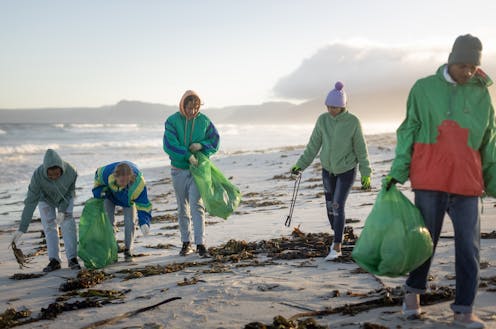Climate change believers are more likely to cooperate with strangers, new research finds
- Written by Ananish Chaudhuri, Professor of Behavioural and Experimental Economics, University of Auckland

People’s willingness to believe in climate change varies greatly, as does their willingness to engage in pro-environmental behaviour, such as energy conservation. We tried to understand the psychological factors behind these differences in our recent study[1].
The problem of climate change presents a social dilemma, one which sets up a conflict between cooperating for the common good and acting in one’s individual self-interest.
For instance, if all fishermen abide by fishing quotas, it is good for everyone. If one fisherman exceeds the quota while everyone else abides by it, then that individual is better off at the expense of others.
But if it is individually rational for one to exceed the quota, then it is rational for everyone to do so, resulting in the rapid depletion of fish stock.
Reducing greenhouse gas emissions is costly. If other countries reduce while one does not, the latter is better off at the expense of the others. But if everyone acts to maximise their own self-interest we get greater pollution and global warming.
Willingness to cooperate
One psychological mechanism that could explain variation in climate change beliefs and pro-environmental behaviour is a general willingness to cooperate in responding to social dilemmas.
Our study uses a set of behavioural economic games to present social dilemma problems to almost 900 New Zealanders. These games offer monetary rewards, and players must choose between prioritising the common good among a small group of strangers or maximising personal gain.
The choice is simple: cooperate in the group interest, which makes one vulnerable to free-riding by others, or maximise one’s self-interest. Free-riding pays more if others cooperate, but if everyone does it then cooperation unravels and everyone is worse off.
Read more: Science alone won't change climate opinions, but it matters[2]
Using such micro-scale social dilemma games, we found a general psychological preference for cooperation that we refer to as the “cooperative phenotype” (phenotype being all observable characteristics of an organism). These were people who routinely cooperate with strangers even if that means sacrificing money.
We then show that those who behaved cooperatively in such small-scale decision tasks were more likely to report engaging in pro-environmental behaviour than individuals who cooperated less.
We also found a positive relationship between cooperation in these games and climate change beliefs. Individuals who cooperated more were more likely to believe in human-caused climate change than individuals who cooperated less.
Linking cooperation and action
Our findings are striking because when people played our games we made no mention of any real-world scenario. The only connection between the games and climate change or the environment was the fact they all involve an opportunity to cooperate in a social dilemma. What, then, might explain the connection?
It is possible that cooperators in our games were also more willing to make sacrifices for the environment and come to believe in climate change as a possible justification for their actions. Here the action drives the beliefs.
Alternatively, it may be that those who are more cooperative find belief in climate change more palatable and as a result come to take pro-environmental action. Here the beliefs drive the subsequent actions.
Read more: Climate change is relentless: Seemingly small shifts have big consequences[3]
We found at least some evidence for the second scenario – those who are more cooperative tended to believe in the facts of climate change and were willing to take action.
Linking climate change to a general drive to cooperate makes us optimistic. Prior work[4] using games very similar to those we used showed people were more likely to cooperate if they believed their peers would do so too. This emphasises the importance of speaking across ideological divides, rather than confining our interactions to those who think like us.
Giving to big and small causes
Intriguingly, we also found a larger proportion of the cooperative types tended to be Green Party supporters rather than National or Labour. This suggests the broad pro-social tendency tapped by the cooperative phenotype may also explain some of the variance in political party support.
This may also be an important predictor of climate change beliefs and pro-environmental behaviour.
Crucially, this doesn’t mean conservatives are less generous. Evidence suggests that when it comes to cooperative issues like contributing to charity, conservatives and progressives don’t differ in how much they give, so much as who they give to.
While progressives are more comfortable with contributing to large anonymous groups (such as charities or governmental agencies), conservative giving is often much more targeted at the local community level[5].
Read more: Scientists understood physics of climate change in the 1800s – thanks to a woman named Eunice Foote[6]
This may partly explain the differences in stance toward climate change, since typical climate change proposals tend to be more global than local.
Our findings apply primarily to a developed Western population and more work is needed to generalise beyond this. However, our work offers the promise that a potential way to change minds is to convince people that climate change issues are merely a larger-scale extension of local social dilemmas.
The more an individual cooperates in micro-scale social dilemmas, the more likely he or she is to cooperate in the large-scale dilemma of climate change and to believe in its reality.
This way of recasting the issue may provide a way of building support for combating climate change across the ideological spectrum.
References
- ^ recent study (www.nature.com)
- ^ Science alone won't change climate opinions, but it matters (theconversation.com)
- ^ Climate change is relentless: Seemingly small shifts have big consequences (theconversation.com)
- ^ Prior work (www.accessecon.com)
- ^ local community level (theconversation.com)
- ^ Scientists understood physics of climate change in the 1800s – thanks to a woman named Eunice Foote (theconversation.com)
















